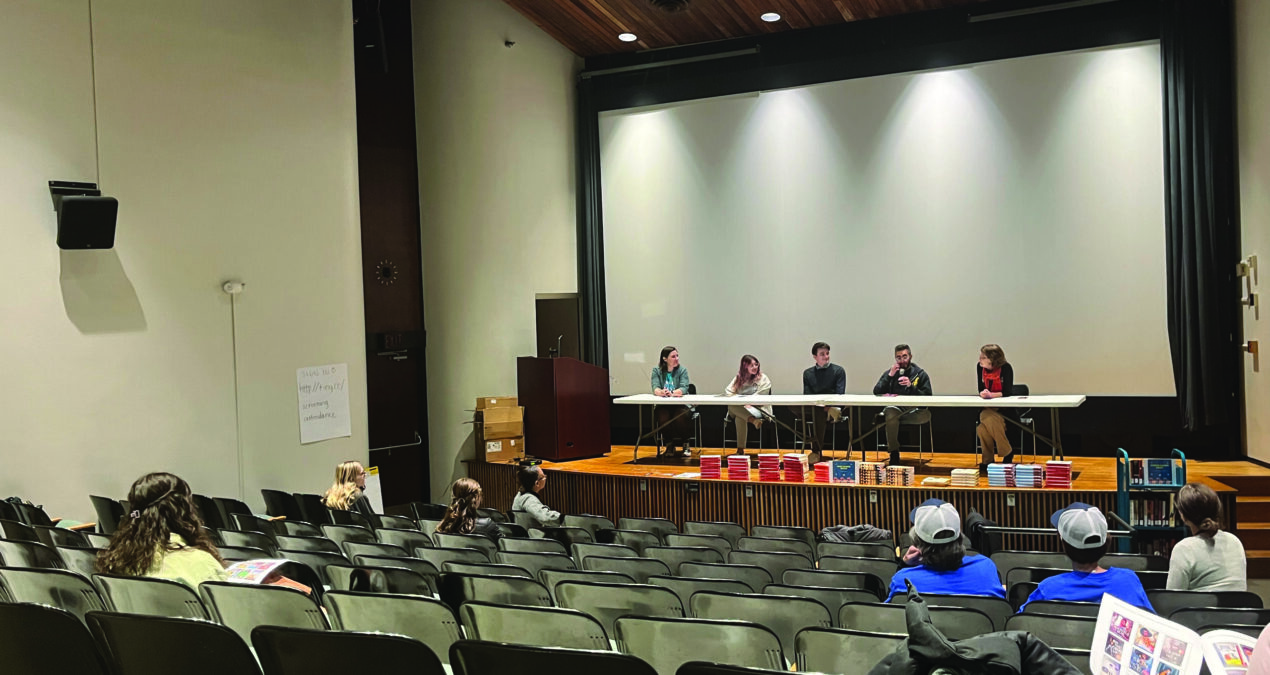Chi Nguyen, Social Media Editor–
“Ban hate, not books.”
This slogan has emerged as a rallying cry among educators, librarians, students, and free speech advocates in response to the increasing number of book bans across the United States. It is also captured in the award-winning documentary named “Banned Together.”
On April 16, the Denison Library, in collaboration with the Queer Studies program, the Center for Belonging and Inclusion and the departments of education, communication, politics and public affairs and English, hosted a special screening of “Banned Together” at Slayter Auditorium.
“Banned Together” is a 2024 documentary directed by Kate Way and Tom Wiggin. Not only does it discuss the rising book bans across the U.S., a controversial issue that threatens democracy and free expression, but it also highlights the empowering of youth voices, showing that young people can challenge authority and make meaningful changes.
As the stage faded to black, the screen lit up. Students, faculty, staff and guest speakers were taken on the inspiring journey of three high school students – Isabella Troy Brazoban, Elizabeth Foster, and Millie Bennett – originally from Beaufort County, South Carolina.
These students became activists after 97 books were abruptly removed from their school libraries in 2022, many of which addressed race, gender, and LGBTQ+ themes. Their efforts from speaking up in school board meetings to collaborating with community-led review committees, eventually led to the reinstatement of 91 of the banned books.
After the screening, discussion was open to everyone in the auditorium. For the topic of book bans, students, professor and librarians were invited as panelists, including Linda Contreras Garcia ‘25, a Communications and Earth and environmental sciences major; Andrea White, psychology professor at Kenyon College; Matthew Jones, collection development librarian at Granville Public Library; and Alonso Avila, academic librarian at Oberlin College.
The space was filled with questions from both students and guests who are librarians and protesters in different areas in Ohio. This event was an opportunity for participants to share, welcome and respect a variety of perspectives on the prominent issues of book bans and free expression.
An audience member during the discussion session expressed her high hopes for the next generation who have great courage to voice their opinions.
Last summer, Garcia spent over 10 weeks doing research about the rhetoric and media strategies of Moms for Liberty, which is also mentioned in the documentary.
Moms for Liberty is a political organization in the United States that advocates for parental rights in education, founded in January 2021 by former Florida school board members Tiffany Justice and Tina Descovich.
Since COVID-19, it has expanded its focus to include campaigning against school curriculum that mentions LGBTQ+ rights, race and ethnicity, critical race theory, and discrimination. Its activities include advocating for the removal of certain books from school libraries and endorsing candidates for public office who align with its views.
Garcia ‘25 and other members in the panelists shared the mixed feeling of anxiety and hopefulness after watching the documentary. Later, she discussed her findings about the linguistic choices that contribute to the rhetorical success of Moms for Liberty.
White has been working as the assistant professor of psychology and neuroscience at Kenyon College since 2006. Her primary research interests focus on identity development in emerging adulthood and midlife. She has collaborated with her students on different projects on the influence of identity processes on political beliefs, religiosity and spirituality.
In response to the question about potential shift in literacy after the book bans, White acknowledged that students are learning about certain topics that they are not supposed to talk about, which causes hesitation to speak up about race, gender or other social identities at school.

